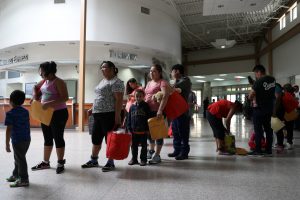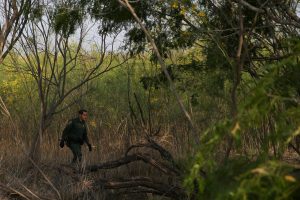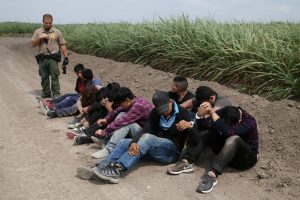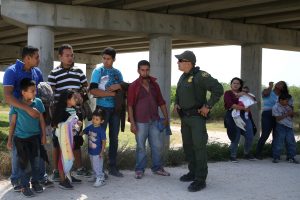
By Yeganeh Torbati and Loren Elliott
LOS FRESNOS, Texas (Reuters) – Luis Campos, a Dallas attorney, showed up at a Texas immigrant detention facility close to the U.S.-Mexico border on Wednesday morning expecting to represent a client before an immigration judge.
But his client – a mother who had been separated from her child by immigration authorities after they crossed the border illegally – was not at the Port Isabel Detention Center. For more than a day, Campos was unable to determine whether she had been released and whether she had been reunited with her child.
Campos did not fare much better with his other appointments. Of the five other clients he had been scheduled to meet with that day, four were no longer at Port Isabel, and it was unclear if they had been released or transferred to other facilities.
“We don’t know what their status is except they’re no longer in the system,” Campos said. “We don’t know where people are right now and it’s been a struggle to get information.”
Lawyers and immigrant advocates working in south Texas this week reported widespread disarray as the federal government scrambled to meet a court-imposed deadline of July 26 for reunifying families separated by immigration officials under the Trump administration’s “zero tolerance” measures.
Half a dozen lawyers Reuters spoke to described struggles to learn of reunification plans in advance and difficulty tracking down clients who were suddenly released or transferred to family detention centers run by Immigration and Customs Enforcement (ICE).
The lawyers said it was often difficult to get through by telephone and that when they did the government employees often knew little about their clients’ status or location.
ICE officials did not respond to questions about the reunification process in Texas and elsewhere.
A government court filing on Thursday said that 364 reunifications had taken place so far. It was unclear from the document, filed as part of an American Civil Liberties Union lawsuit challenging parent-child separations at the border, exactly how many more were likely.
Of more than 2,500 parents identified as potentially eligible to be reunited with their children, 848 have been interviewed and cleared for reunification, government attorneys told the court. Another 91 have been deemed ineligible because of criminal records or for other reasons.

Undocumented immigrants recently released from detention prepare to depart a bus depot for cities around the country in McAllen, Texas, U.S., July 18, 2018. Picture taken July 18, 2018. REUTERS/Loren Elliott
BUSY SHELTERS
Evidence of the reunification efforts can be found throughout the Rio Grande Valley area, a border region that covers the southern tip of Texas and includes small towns like Los Fresnos.
Children arrive in vans at the Port Isabel Detention Center near Los Fresnos late into the night, lawyers said.
A sprawling church site in San Juan, around 60 miles (97 km) away, was designated as a migrant shelter after it became clear that a large number of reunited families would be released from Port Isabel.
The shelter has been housing between 200 and 300 adults and children on any given night this week, according to migrants who spent time there.
The same court order that required separated families to be reunited also ordered the government to stop separating new arrivals at the border and some families who have crossed in recent weeks have been detained together.
But ICE has limited facilities to house parents and children together, and strict rules apply regarding how long and under what circumstances it can keep children locked up.
Claudia Franco, waiting to board a bus at a terminal in McAllen, near San Juan, said she and her daughter traveled from Guatemala and were apprehended by U.S. Border Patrol after entering the United States last week. The pair were released from custody a few days later, and Franco was given an ankle monitor during her legal fight to remain in the country.
President Donald Trump has called for an end to such swift releases, which he refers to as “catch-and-release.”
‘WILD WEST LAWYERING’
Having attorneys can make a crucial difference for Central American migrants trying to negotiate the complexities of the legal system.
Angela, a Honduran woman who declined to give her surname, had initially been found not to have a “credible fear” of returning to Honduras, something that must be established as the first step in an asylum claim.
On Monday, she appeared in immigration court with attorney Eileen Blessinger. The judge reversed that initial finding. The next day, Angela was reunited with her daughter after more than a month apart and the two will seek asylum in the Indianapolis area, she said in a phone interview from a shelter.
Lawyers said that other clients will be deprived of representation in court because of the chaotic reunification and release process.
“It’s all totally like Wild West lawyering,” said Shana Tabak, an attorney with the Tahirih Justice Center, which provides legal services to migrants. “The government is moving really quickly, without a lot of advance planning it seems.”
One urgent priority, said Tabak, was making sure immigrants who leave the area change the location of their impending proceedings to a court near their eventual destination.
But that can be difficult. On Wednesday afternoon, Campos and a colleague met with a migrant client at a shelter, and just by chance, he ran into a Honduran woman who he had met with earlier this month at Port Isabel. Unbeknownst to him, she had been released and was now with her young son. They quickly exchanged a few words.
“They were just bouncing with joy,” he said. “We agreed to talk later that day and then I couldn’t find her after that.”
(Reporting by Yeganeh Torbati and Loren Elliott, editing by Sue Horton and Rosalba O’Brien)



